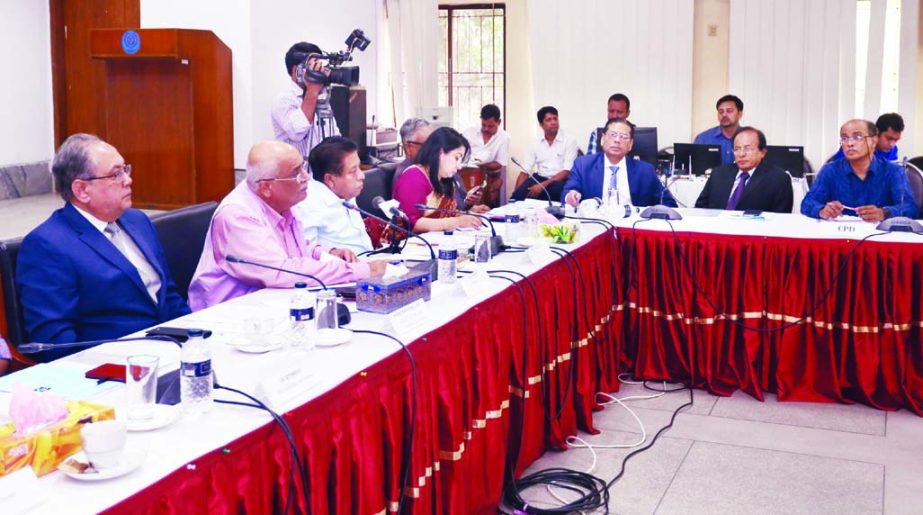
Staff Reporter :
Centre for Policy Dialogue (CPD) organised a discussion meeting on Thursday titled as ‘Flood 2017: Assessing Damage and Post-flood Management’ at CIRDAP auditorium in the city.
Distinguished Fellow of CPD Dr Debapriya Bhattacharya moderated the discussion meeting while Minister of Water Resources Ministry Anisul Isalm Mahmud was the chief guest and Member of Parliamentary Standing Committee on Ministry of Disaster Management and Relief Dhirendra Debnath Shambhu was present as special guest in the meeting.
Climate Change and Hydrology specialist Professor Dr Ainun Nishat, Professorial Fellow of Bangladesh Institute of Development (BIDS) Dr M Asaduzzaman, Distinguished Fellow of CPD Mustafizur Rahman, Director General of Bangladesh Water Development Board (BWDB) Engineer Md. Mahfuzur Rahman, Director of Crop Wing of Department of Agricultural Extension (DAE) Hanif Mohammad, among others, spoke in the meeting.
Senior Research Associate of CPD Md Zafar Sadique and Estiaque Bari presented the key-note paper in the meeting.
According to the research, recent floods have crossed previous records of floods in the country.
Recent floods in the month of April and August 2017 affected 46.7 and 82 lakhs people respectively in the affected districts.
The loss of Boro in April flood amounted to Tk 5300 crore which was 8.3 per cent of national Boro production. Vegetables of about 460 hectares of land were damaged. In addition an amount of Tk 4500 crore were needed to rebuild houses, infrastructure and embankments and Aman crop of Tk 1800 crore was damaged.
These floods have reduced purchasing power of people of flood affected areas, increased burden of loan repayment, distressed sale and increased cost of agricultural inputs for re-plantation.
Zafar Sadique said two fold recent floods in the northern part of the country left million people homeless, ruined crops, livestock, fisheries, embankments, roads, infrastructure and made poor poor with burden of loans. The farmers of haors after losing the only crop in the field are struggling to cope with the situation and many are still living on the embankments as they have nowhere to go to live in.
“Though government and aid agencies distributed emergency relief, but inadequate, not coordinated and distributed through weak distribution channels,” said Zafar Sadique.
Estiaque Bari pointed out that 66.5 thousand MT rice was allocated to distribute through VGF programme among 3.8 lakh families in haor areas for six months is equivalent to 36.8 per cent of total flood affected households.
Government support covered 68.4 per cent of the total number of farmers affected by the flash flood.
Dr Ainun Nishat said “Flood affected people are still fighting with the post flood situation. Government is keen to help the flood affected people but relief distributed were not adequate to meet the peoples demand and BWDB should be concerned about continuous embankment management and maintenance for which people suffered a lot this time,”
“Our institutional weaknesses are there, poor agricultural infrastructure, weak embankment, few expertise on haor hydrology and high level of corruption in infrastructural development are increasing sufferings besides natural calamities,” Ainun Nishat mentioned.
Dr M Asaduzzaman said “Good governance required in the flood prone areas. Roads, embankments and infrastructures are built every year and washed out overnight due to flood and disaster. Our development is investment oriented and not sustainable; it may not help to achieve Sustainable Development Goals (SDGs) by 2030,”
“We are losing our money and resources due to poor governance where continuous maintenance is a must to be sustainable,” he added.
Anisul Islam Mahmud said we have lack of human resources and adequate technologies. BWDB is keen to build sustainable embankments but people of flood prone areas puts enormous pressure on the embankments by building houses, raising cattle and cut the embankment for carrying crops through it over time and thus suffer during the flood.
“Climate change and trans-boundary river management are the key challenge now to mitigate flood and other natural calamities. Not only our country is suffering, but it is now global issue. We are working to resist such calamities,” he added.

